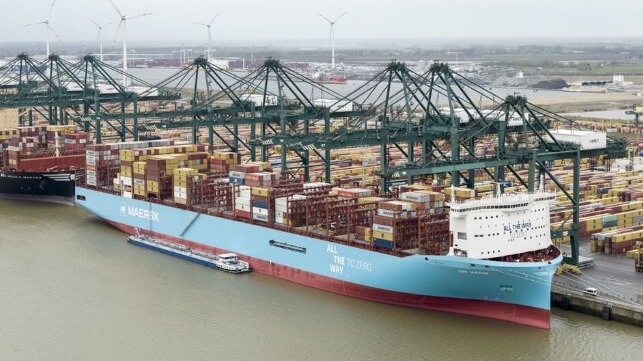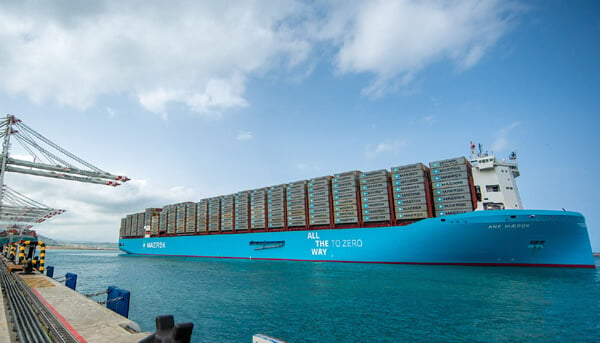Maersk Expands Methanol Ops, Naming Second Vessel and Bunkering in Antwerp

Maersk is continuing to move forward with the efforts to roll out its fleet of methanol-enabled containerships. This week marked both the naming of the second of the company’s large ocean-going vessels as well the first bunkering in Europe. Pictures as the first ship reached Europe also highlighted the uniqueness of the new class’s design now that the ships are in service and carrying containers.
The Danish shipping giant named the second 16,000-TEU vessel Astrid Maersk, in honor of Astrid Uggla, the granddaughter of Ane Maersk Mc Kinney Uggla. The company is also using the celebrations of the new ships to strengthen its global customer ties with the naming of the methanol-enabled vessel taking place today in the port of Yokohama, Japan. Liza Uchida, spouse of Makoto Uchida, CEO of Nissan Motor Corporation, served as godmother and christened the vessel.
Astrid Maersk is the second of the 18 large methanol-enabled vessels that the shipping line expects to be delivered in 2024 and 2025. The delivery of four additional sister vessels is expected in the second half of this year. Maersk plans to name the third ship in Los Angeles, California in the coming months.
Just like its sister vessel Ane Maersk which was named in January this year, the container vessel was built by Hyundai Heavy Industries (HHI) in South Korea and is equipped with a dual-fuel engine developed by German engine manufacturer MAN Energy Solutions. It is capable of operations on methanol as well as biodiesel and conventional bunker fuel.
-Antwerp-Bruges.jpg)
The first vessel of the class, Ane Maersk has now completed its maiden voyage making port calls in Tangiers as well as the UK, Germany, and at the beginning of this week Antwerp. The vessel completed its first bunkering operation in Europe on April 1 in Antwerp.
The bunkering took place at the MPET terminal in Antwerp. TankMatch dispatched two barges to transfer 4,300 tons of green methanol onto the Ane Maersk. Subsequently, a barge from VT Group delivered 1,375 tons of biodiesel (B100).
Antwerp, which is the fifth largest bunkering port in the world, highlights that it is also a new milestone in its ambition to become a multifuel port. The Port of Antwerp-Bruges highlights that it already has the capacity to store climate-neutral fuels for use within its industrial cluster and distribution inland. The port’s first methanol bunkering operation took place in June 2023 when 475 metric tonnes of methanol were bunkered onto the tanker Stena Pro Marine.
-Antwerp-Bruges.jpg)
In addition to enabling the new vessels for methanol operations, Maersk redesigned the containership to improve cargo handling and increase capacity. The deckhouse has been moved to the first of the vessel and the funnel offset to one side to improve container efficiency. The pictures show how the vessel looks in operation.
Maersk is implementing a policy of only ordering new vessels able to operate on green fuels. The first class consists of a total of 12 vessels with a 16,000 TEU capacity as well as six with a 17,000 TEU capacity. The company has also ordered six vessels with a 9,000 TEU capacity and in the coming months is scheduled to start the first conversion of an older vessel to permit methanol operations. Maersk introduced the first methanol dual-fuel containership, the Laura Maersk, a feeder ship with a capacity of 2,136 TEU, in September 2023.

that matters most
Get the latest maritime news delivered to your inbox daily.

Arriving Tangiers during her maiden voyage fully loaded (Tangiers Med Port)
